TXT (Textiel)
TEXTIEL | TEKST | CONTEXT
De textielafdeling van de Gerrit Rietveld Academie heet TXT, een afkorting voor textiel en tekst. Beide woorden stammen van het Latijnse woord voor weven, tessere. Binnen de afdeling doen studenten praktisch maar ook theoretisch onderzoek naar materiële cultuur. Ze vinden nieuwe toepassingen voor technieken zoals weven, vilten, breien en printen, of vertalen textiele systemen naar andere contexten. Deze experimenten kunnen resulteren in een veelheid aan uitkomsten: nieuwe materialen, innovatieve toepassingen, autonoom werk of geëngageerde statements in de vorm van een essay, lezing of performance. De relatie tussen het geschreven woord en het materiaal wordt doorlopend onderzocht, getest, bediscussieerd, gerecycled en gepresenteerd. Eindeloos zijn de mogelijkheden om textiel te produceren in relatie tot sociale netwerken, kleding en architectuur.
In het kort:
Textiel | Context | Tekst | Tactiliteit | Textuur | Theorie | Techniek | Tekstualiteit

Programma
Materiaalonderzoek en -kennis
Conceptontwikkeling: Ontwikkelen en testen van concepten in een bredere context
Redactionele vaardigheden: Inventariseren + schrijven + redigeren + presenteren
Materiële cultuur: Lezen/studeren + filosoferen + presenteren
Schrijven, tekenen en kunstgeschiedenis
Weefwerkplaats
Textielwerkplaats
Manier van werken
Collectief onderzoek; individuele gesprekken; begeleiding met feedback van andere studenten; workfloor (reflecterende en redactionele les), excursies, bezoek aan een tentoonstelling of veldproject in een artist in residency.
Contact / See also
textiel@rietveldacademie.nl
Opbouw studie
Eerste vakjaar
In het eerste vakjaar verruim je je blik, maar leer je ook kritisch naar je eigen werk te kijken. Je leert nieuwe stoffen te maken en in een context te plaatsen. Je krijgt inzicht in de eigenschappen en mogelijkheden van textiele materialen. Via individuele en groepsopdrachten word je uitgedaagd te experimenteren met technieken, materialen en met het ontwerpen zelf. Opdrachten kunnen zowel lichaams- als ruimte gerelateerd zijn. Daarnaast is er veel aandacht voor theorie en schrijven om zo je eigen gedachten te leren ontwikkelen en verwoorden.
Tweede vakjaar
Het tweede vakjaar draait om het verdiepen van je eigen werk en het ontdekken van jouw positie als maker. Ben je een materiaalspecialist, een designer of geëngageerd verbinder? Hoe verhoud je je tot de wereld? Welke rol speelt jouw werk daarbij? Welke taal spreekt jouw materiaal? Samenwerking met studenten van andere afdelingen wordt aangemoedigd.
Derde vakjaar
Een stage van twee maanden markeert de overgang van het tweede naar het derde vakjaar. Van dit laatste jaar is het schrijven van je essay een belangrijk onderdeel. Het essay helpt je om te reflecteren op je werk. Je laat zien dat je je bewust bent van de context waarin je opereert en welke positie jij als TXT'er inneemt in de (kunst)wereld. Uiteraard besteed je een groot deel van je tijd aan de ontwikkeling van objecten, materialen en artefacten voor het eindexamen. Samen met een curator en collegastudenten richt je de eindexamenexpositie in. Daarna mag je je Bachelor of Art & Design (BA) noemen.
Theorie
Binnen TXT is veel ruimte voor theorie. Een sessie per week is voor lezen, schrijven en analyseren van teksten. Filosofie en conceptueel denken zijn belangrijk. En het Studium Generale is een standaardonderdeel van het lesprogramma. Lezingen van externe sprekers uit binnen- en buitenland zorgen voor een historische of theoretische context van de hedendaagse internationale kunstwereld. Voor meer informatie, zie Studium Generale.
Stage en uitwisseling
TXT-studenten gaan aan het einde van het tweede of aan het begin van het derde vakjaar op een stage van maximaal twee maanden. Het is ook mogelijk om als uitwisselingsstudent naar een van de samenwerkende academies te gaan.
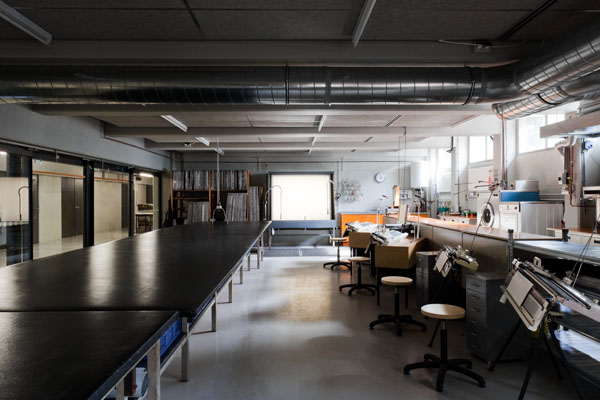
Textile workshop / Textiel werkplaats
Projecten
Neighborhood Knitting (2004), Bed Pieces (2005), Cover Space (2005), City Slicker project (2006), Real Textiles lectures (2010), D.I.G./Dress Information Group (2011); House Home or Both? Schiedam (2011), Shanghai Gesture, weaving a cultural exchange (2012), Enacted Magazine, presentations at Wongema (2012), Rainproof with Aliki van der Kruijs (2013), Domestic project, social research (2013), Wardrobe Research project (2014), North South Axes, Rethinking Richard Tuttle (2013), Body Minus Garment Equals (2015), Fieldwork, an exploration on farming, weaving and thinking (2016)
Samenwerking en uitwisseling met de textielafdelingen van Sint Lucas (Gent), Tama Art University (Tokio), Weissensee School of Art (Berlin), het Fries Museum (Leeuwarden), Europees Textiel Netwerk (Hannover) en Weefnetwerk Nederland
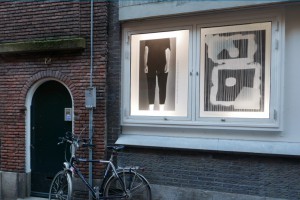
Eight Cubic Meters door TxT (Textiel)
Lees meer
Body minus garment equals
De TXT afdeling presenteert met trots een selectie van beelden, teksten en weefsels van een gezamenlijk onderzoek naar lichaam, kleding, gedrag en identiteit. Te zien in Eight Cubic Meters van woensdag 27 januari tot 9 mei.
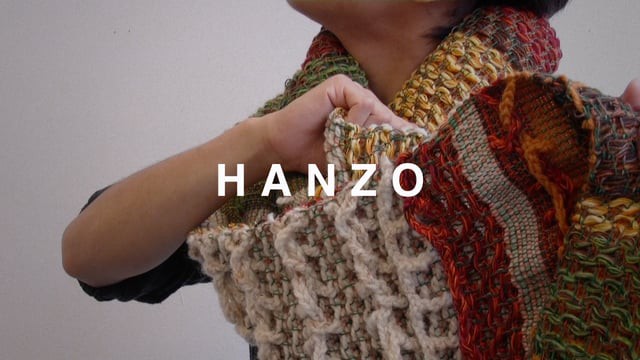
Body minus garment equals - 16 december 2015
Lees meer
TxT (Textile) years 1 and 2 congregated in a collective project about dress information. This semester, the group dives into garments and researches the way garments relate to bodies. There will be a screening and exhibition in the Glass Pavilion on 16 December, 4PM.
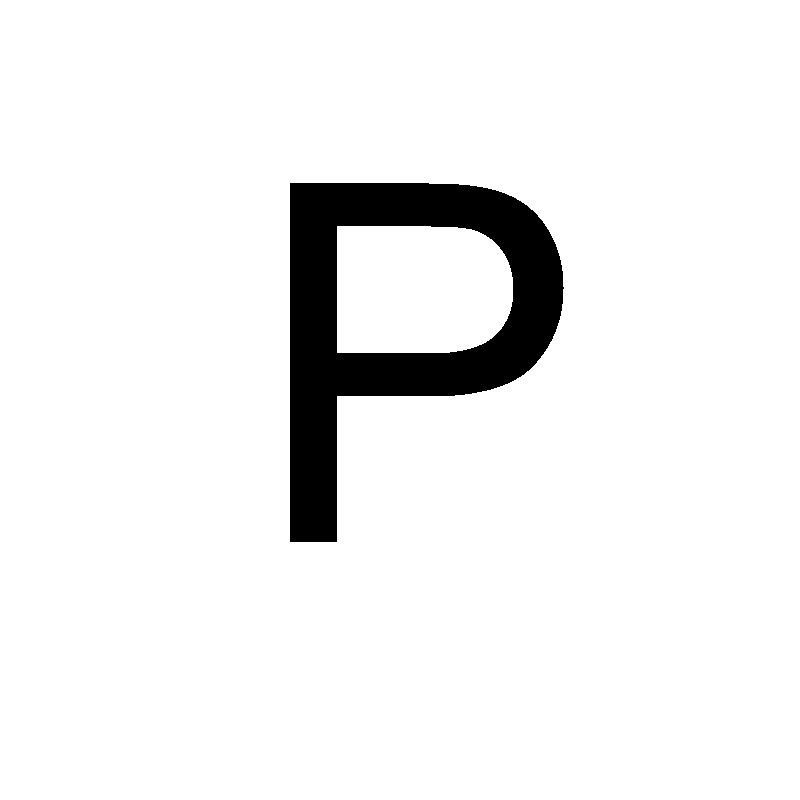
Eight Cubic Meters en TxT (Textile) presenteren: Maria Naidich
Lees meer
Eight Cubic Meters door TxT ( Textiel) presenteert :
Maria Naidich / Presente!
14 januari (16 uur) - 15 maart (16 uur)
' 5000 mensen worden elk jaar in Mexico ontvoerd. Op de 26 september, ontvoerde de politie 43 studenten van het Rural college San Isidro Burgos in Guerrero, Mexico . We leven een alarmerende situatie met grote hoeveelheden doden en geweld, als gevolg van een beschadigde regering. Als student, als Mexicaanse, als mens voel ik me verantwoordelijk om te protesteren en informatie te verspreiden en te vertellen wat er werkelijk gebeurt in mijn land. Ik wil hiermee tevens steun betuigen aan de mensen die leven in deze situatie in mijn geboorteland Mexico.
Ik heb video- prestaties gemaakt op de academie met internationale studenten afkomstig uit Turkije, Zweden, Rusland, Bosnië, Japan, Tunesië, China, Nederland en 15 andere landen . In de video zegt iedere student zijn of haar naam en het land waar ze vandaan komen en het woord "aanwezig" in hun eigen taal. Wij zijn ons ervan bewust, en we zijn aanwezig.
In de performance, droegen we t-shirts met de gezichten van de 43 studenten, allen getekend door de student die het draagt. In dit proces creëerden studenten een verbinding met een andere student die ze nooit zullen ontmoeten, en wat nooit meer zou kunnen gebeuren.
Van 14 januari tot 15 maart zal Maria Naidich (student van de afdeling Textiel) haar werk tonen in de vitrines van Eight Cubic Meters in de Sint Nicolaasstraat in Amsterdam . De vitrines zijn dag en nacht te bezoeken.
Voor meer informatie over dit project neem contact op met Buro Rietveld : buro@rietveldacademie.nl
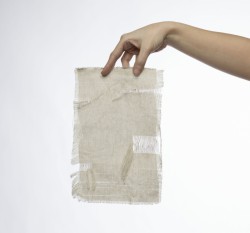
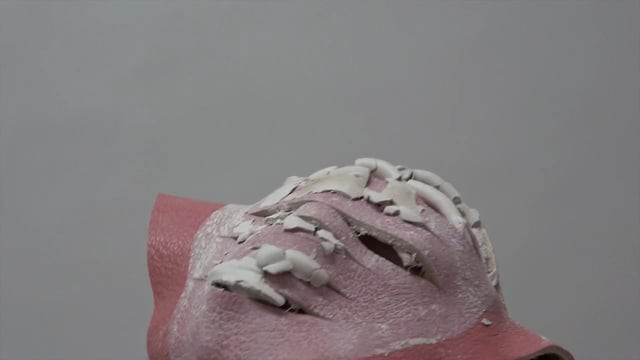
2017-01-26 11:36:07
This movie shows the new possibilities of the stretched out and cutted-up leather and non-leather samples. I could imagine these movable structures applied in architecture or stage design, but this movie also points out another point of view. Can a small piece of left-over leather perform again on its own, as it once did when it was animal skin?
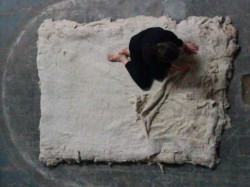

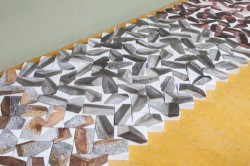
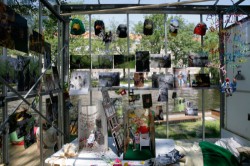
Studenten 1e jaar
Studenten 2e jaar
